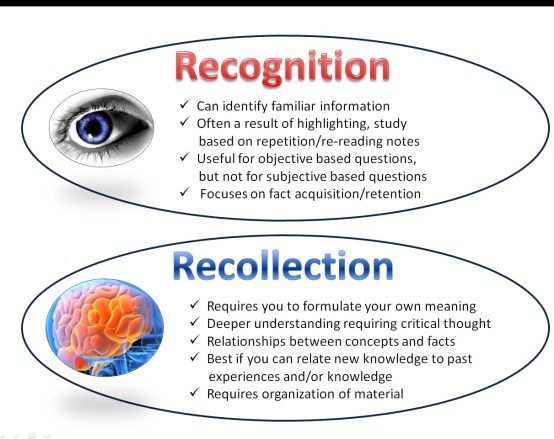A large part of my job is to design and deliver programming that supports university students in their academic pursuits. The learning theory that I rely on most heavily is the cognitive theory. Many of the workshops I design and deliver are focused on metacognition, or helping students learn about how they learn so that they can employ strategies to be successful. For example, here is a slide taken from our “Writing Tests” workshop:

This slide is meant to help students think about what type of memory retrieval strategy is required by them for different types of exams and exam questions. In subsequent slides we give them information about different strategies that might work for each type of exam. We also talk about how the expectation in university is usually deeper level processing. This is often a steep transition for students.
Dr. Stephen Chew is a cognitive psychologist in the US who is well-known for his work on metacognition. He has come up with many strategies to help students really think about how they learn and apply the best strategies to ensure academic success. I often show students his YouTube videos, and example of which is as follows:
So in practice, I spend a lot of time teaching cognitive strategies to students and asking them questions of them to help them understand their own cognitive processes. But do I think the cognitive learning theory explains how all people learn? Is it “the best” theory? Have I been focusing my time and efforts correctly?
For me, the answers to those questions in partly yes. Like it or not, the style of learning and assessment that most university instructors employ is rooted in cognition. Lectures, note-taking, multiple-choice exams and essay exams all rely on mental processing and focus on testing memory retrieval. It would be difficult to find a 100-level instructor who didn’t employ those methods.
However, I agree with Ashley that there is no one best learning theory. One thing I do not like about the cognitive theory (and cognitive style of teaching) is that it doesn’t account for the importance of experience. Constructivism is used some in universities, especially as part of experiential learning and work experience programs. According to Ertmer and Newby, constructivism is best for advanced knowledge acquisition. As well, learning processes are more important than content. I think this type of learning is very important for students to be able to transfer their learning to the real world.
Connectivism is very interesting to me. In my experience it is not a learning theory that is embraced in universities. In Connectivism: a Learning Theory for the Digital Age, Siemens states:
The field of education has been slow to recognize both the impact of new learning tools and the environmental changes in what it means to learn. Connectivism provides insight into learning skills and tasks needed for learners to flourish in a digital era.
I have to agree with Siemens in this regard. I recently read an opinion piece that explains how two U of T professors are banning electronic devices from their classroom. They believe that the devices are a cause for distraction and prevent the students from concentrating and learning. Siemens would probably strongly disagree with this approach, as he would believe that using these devices and the internet would lead to the students forming connections and therefore learning deeply.
So I agree with Ertmer and Newby that the goal should be using a variety of learning styles in order to make sure our students become adaptive learners. To support this, I will have to learn and implement new strategies to help the students I work with. For example, I found an article that lists some strategies to implement connectivism into a learning environment, such as using social networking more and encouraging students to join professional networks. I will have to try to implement some of these strategies and encourage my students to make connections between the different disciplines and concepts they are learning.
Great question! I honestly think if one of your main goals with your students is preparing them to be successful, you should work some old-fashioned lecture and note-taking as part of you teaching strategy. I don’t think that it is the only strategy you should use by any means, but I do think it is important to at least introduce the students to some cognitive strategies. I work with students who did well in high school, but land on academic probation after first semester because they couldn’t keep up with the material. Of course that is just my opinion and I would love to hear from others.
LikeLike